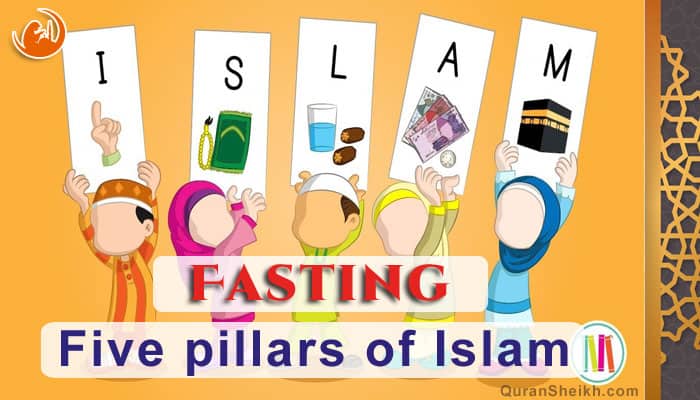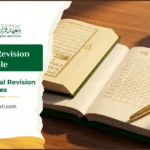Fasting – Five Pillars of Islam
#04. Fasting – Sawm
Fasting means “to refrain from eating, drinking and having sexual intercourse throughout the day, right from the break of dawn up to sunset, with a clear intention of seeking the pleasure of Allah.” If somebody refrains from food, drink, and sex for any reason other than seeking the pleasure of Allah, it cannot be called a “fast” in the terminology of the Shari’ah.

In the Noble Quran Allah says:
وَكُلُوۡا وَاشۡرَبُوۡا حَتّٰى يَتَبَيَّنَ لَـكُمُ الۡخَـيۡطُ الۡاَبۡيَضُ مِنَ الۡخَـيۡطِ الۡاَسۡوَدِ مِنَ الۡفَجۡرِؕ ثُمَّ اَتِمُّوا الصِّيَامَ اِلَى الَّيۡلِ
And eat and drink until the white thread of dawn becomes distinct to you from the black thread [of night].
Then complete the fast until the sunset. (al- Baqarah:187)
Fasting in the month of Ramadan is of great importance because Allah says:
يٰٓـاَيُّهَا الَّذِيۡنَ اٰمَنُوۡا كُتِبَ عَلَيۡکُمُ الصِّيَامُ کَمَا كُتِبَ عَلَى الَّذِيۡنَ مِنۡ قَبۡلِکُمۡ لَعَلَّكُمۡ تَتَّقُوۡنَۙ ۞
O you who have believed, decreed upon you is fasting as it was decreed upon those before you that you may become righteous. (al- Baqarah 183)
In this verse, Allah Almighty declares fasting to be a means of attaining piety, because it is for Allah alone and there is no possibility of hypocrisy in it. Fasting is the only intention and Allah almighty knows intention only. And fasting is the best means of strengthening one’s willpower, where one gives up all the necessities of life and pleasures only for the sake of God’s command, and if this passion remains all year round, then the highest level of piety can be attained.
But fasting alone is not enough for piety, the state of fasting must remain in all stages of life and it is necessary for the whole being to fast, not to enter into bad thoughts, dirty thoughts, misdeeds, bad character, etc.
In addition, fasting is the best form of worship that Allah Almighty has made obligatory on His servants so that they may benefit from the special blessings of God on the Day of Resurrection and they can get benefit from the worldly benefits and effects of fasting.
Virtues of the Holy Month Ramadan:
Ramadan is the month of God Almighty and it is the best of all months. This is the month in which the gates of heaven and mercy are opened, and the gates of hell are closed. There is one night in this month in which worship is better than a thousand months of worship. Humans should think about the significance of this month’s night.

Therefore, protect your limbs from disobedience to God. Beware that no one sleeps on the nights of this month and does not neglect the remembrance of the Almighty during the days of this month, because it has been narrated that during the Iftar time in the month of Ramadan, He frees one hundred thousand people from the fire of Hell, and every hour on Friday, God saves thousands of people from the fire of Hell.
Also, in the last night and day of this month, the Allah Almighty frees of His servants from Hell as He has freed in the whole of Ramadan. Regarding the virtues of Ramadan, the Holy Prophet (SAW) says in his famous sermon:
This month is better than all the other, Whose days are better than the days of other months, whose nights are better than the nights of other months and whose clocks are better than the clocks of other months. This is the month in which the Almighty has invited you to His hospitality and in this month God has declared you among the noble people, your breathing is glorified and your sleeping is counted as worshiped. In this month, your deeds and your prayers are accepted.
So, take care that this blessed month is over and the burden of sins still remains on your neck and when the fasting people are reaping the rewards of their fasts, you will be counted among those who are being deprived. You should get closer to God by reciting the Qur’an, offering prayers at the best time, striving in other acts of worship, and repenting and seeking forgiveness.
In the month of Ramadan, a person will be forgiven when he fasts with all the jurisprudential and moral conditions and swears by Allah in this holy month that he will try his best to avoid from all evils.
This month is a great season of the bondage of Allah and getting this month in your life is a great blessing and great grace of Allah. He gives it those whom he wants so that they can get more rewards by worshipping Allah Almighty and their relationship with their Creator becomes strong. Allah Almighty says in the Noble Quran:
شَهۡرُ رَمَضَانَ الَّذِىۡٓ اُنۡزِلَ فِيۡهِ الۡقُرۡاٰنُ هُدًى لِّلنَّاسِ وَ بَيِّنٰتٍ مِّنَ الۡهُدٰى وَالۡفُرۡقَانِۚ فَمَنۡ شَهِدَ مِنۡكُمُ الشَّهۡرَ فَلۡيَـصُمۡهُ ؕ وَمَنۡ کَانَ مَرِيۡضًا اَوۡ عَلٰى سَفَرٍ فَعِدَّةٌ مِّنۡ اَيَّامٍ اُخَرَؕ يُرِيۡدُ اللّٰهُ بِکُمُ الۡيُسۡرَ وَلَا يُرِيۡدُ بِکُمُ الۡعُسۡرَ وَلِتُکۡمِلُوا الۡعِدَّةَ وَلِتُکَبِّرُوا اللّٰهَ عَلٰى مَا هَدٰٮكُمۡ وَلَعَلَّکُمۡ تَشۡكُرُوۡنَ ۞
The month of Ramadhan [is that] in which was revealed the Qur’an, a guidance for the people and clear proofs of guidance and criterion. So whoever sights [the new moon of] the month, let him fast it; and whoever is ill or on a journey – then an equal number of other days.
Allah intends for you ease and does not intend for you hardship and [wants] for you to complete the period and to glorify Allah for that [to] which He has guided you, and perhaps you will be grateful. (Al-Baqarah: 185)
Virtues of fasting:
It is good news for the fasting person that the first ten days of Ramadan are a source of God’s mercy. The next ten days are set for his forgiveness. And the last ten days are set to be saved from hell.

This virtue has also come to the part of the fasting person that one of the odd nights of the last ten days of the month of Ramadan is a night whose worship is better than the worship of a thousand months. There are so many Hadiths describing the virtues of fasting. Few of them are here:
It is Narrated by Hazrat Abu Huraira (R.A) that Allah’s Messenger (Peace be upon Him) said, “Fasting is a shield (or a screen or a shelter). So, the person observing fasting should avoid sexual relation with his wife and should not behave foolishly and impudently, and if somebody fights with him or abuses him, he should tell him twice, ‘I am fasting.”
The Prophet (Peace be upon Him) added, “By Him in Whose Hands my soul is, the smell coming out from the mouth of a fasting person is better in the sight of Allah than the smell of musk. (Allah says about the fasting person), ‘He has left his food, drink, and desires for My sake. The fast is for Me.
So I will reward (the fasting person) for it and the reward of good deeds is multiplied ten times.” (Sahih al-Bukhari 1894)
It was narrated from Hazrat Abu Hurairah (R.A) that the Messenger of Allah (peace and blessings of Allah be upon Him) said:
“Every good deed of the son of Adam will be multiplied manifold. A good deed will be multiplied ten times up to as many as seven hundred times, or as much as Allah wills. Allah says: ‘Except for fasting, which is for Me and I shall reward for it. He gives up his desire and his food for My sake.’ The fasting person has two joys, one when he breaks his fast and another when he meets his Lord. The smell that comes from the mouth of a fasting person is better before Allah than the fragrance of musk. (Sunan ibn Majah 1638)
From the above hadith, it is clear that the reward for good deeds is ten times more than seven hundred times due to the sincerity of intention and sometimes even more, but the reward for fasting is infinite and immeasurable. It does not need any measure and calculation, no one knows its quantity except Allah Almighty. The reasons for such a virtue of fasting are as follows:
The first reason: fasting is hidden from the people and no one can know it except Allah Almighty, while this is not the case with other acts of worship because their condition can be known to the people. In this sense, fasting is for the sake of Allah alone.
The second reason: in fasting, the body has to go through the furnace of patience, hardship, and endurance. In fasting, one has to be patient with hunger, thirst, and other desires of the soul, whereas in other acts of worship there is not so much hardship.
Third reason: Hypocrisy does not interfere with fasting, while hypocrisy can be seen in other outward acts of worship such as prayers, Hajj, Zakat, etc.
Fourth reason: Abstinence from food and drink is one of the attributes of God Almighty. Although the fasting person may not be similar to this attribute of the Almighty, but in a way, he becomes close to God by doing this within himself.
Fifth reason: No one knows the reward of fasting except the Allah Almighty, while the reward of the rest of the acts of worship has been revealed to the creatures by the Allah Almighty.
Sixth reason: Fasting is an act of worship that no one can know even angels except the Allah Almighty.
Seventh reason: The addition of fasting is for the sake of honor and greatness, just as Kaba is only for the sake of honor and dignity, otherwise all the houses belong to Allah.
Eighth reason: The fasting person tries to create the attributes of angels in himself, so he is loved by the Almighty.
Ninth Reason: There is no limit to the reward of patience during fasting, so the Almighty attributed it to Himself by declaring the reward of fasting in Ramadan to be infinite.
It is Narrated by Hazrat Sahl (R.A):
The Prophet (PBUH) said, “There is a gate in Paradise called Ar-Raiyan, and those who observe fasts will enter through it on the Day of Resurrection and none except them will enter through it. It will be said, ‘Where are those who used to observe fasts?’ They will get up, and none except them will enter through it. After their entry, the gate will be closed, and nobody will enter through it.” (Sahih al-Bukhari 1896)
It was narrated from Abu Hurairah that the Messenger of Allah (PBUH) said:
‘Whoever fasts Ramadan out of faith and the hope of reward will be forgiven his previous sins.” (Sunan ibn Majah 1641)
Physical and spiritual benefits of fasting:
While fasting is a means of maintaining one’s inner purity and spiritual health, it also includes the treatment of one’s physical health and digestive disorders, and also there is the well-known fact that overeating can lead to gastrointestinal disorders. This does not lead to proper physical development, but due to an unhealthy diet and unspecified mealtimes, most people die.

In order to prevent these irregularities throughout the year and to adhere to the principles of health and well-being, it was necessary for human beings to be bound for thirty days to eat and drink at the prescribed time and to refrain from eating and drinking after the prescribed time.
What a wisdom it is that along with worship, a man also attains physical health, and with the maturity of the soul, his physical health gradually attains perfection. Experience has shown that in Ramadan, most people’s physical ailments go away on their own just by restriction of mealtimes. Therefore, the great Islamic scholars have also mentioned the wisdom of physical health among other wisdom of fasting.
“Fasting is Zakat of the body.”
That is, just as giving zakat purifies one’s wealth, so fasting also purifies one’s body from diseases. Overeating increases the dominance of materialism and attacks sexual desires. One of the benefits of fasting is that staying hungry and thirsty throughout the day leads to some weakness in the body organs which cools the attacks of sexual emotions. Hunger and thirst suppress sexual arousal.
It is narrated by Hazrat Abu Hurairah (R.A) that the Messenger of Allah (Peace be upon Him) said:
الصِّيَامُ جُنَّةٌ
Fasting is a shield. (Sunan an-Nasa’i: 2228)
This not only means that it is a shield from the fire of Hell, but it also means that fasting is a shield against sexual arousal as well as all kinds of material and spiritual ailments, such as hunger and thirst suppressing one’s sexual desires and this draw him to God.
In other words, fasting is the name of maintaining the balance of body and soul. The storms of materialism keep rising from the body of humanity. If these storms are not stopped, then the human body will become a manifestation of lust and the human body will not be able to control these desires. Therefore, God Almighty rewarded us with a great act of worship such as fasting to save us from self-desires and materialism, so that the human body and soul would be in balance and the human soul would be submissive and rejoicing in the remembrance of God.
Islam does not teach us that a person should deprive himself of essential food which would lead to the bankruptcy of his health. Reducing food to an extent that does not keep the body strong and energetic, or doing exercises that break the body, is not a worship, but a punishment. And Allah Almighty is very kind to His servants. he does not want us to do so.
So the purpose of fasting is not that it is meant to eliminate sexual feelings, but fasting is a hidden act of worship that has nothing to do with appearances. its importance is not with hunger and thirst, but its purpose is to purify from all kinds of soul desires. one should avoid sins, keep on reforming one’s soul, and its purity so that fasting becomes a means of attaining the piety for which it is obligatory.
Fasting also helps in staying steadfast in difficult campaigns. The purpose of fasting is self-control and self-control is the real jihad. If a man does not develop the importance of enduring hunger and thirst, he will not be able to cope with difficulties. In Islam, jihad is also a duty and an act of worship. High morale, perseverance, and adventurous qualities are required to fulfill this duty. For mujahids who travel in all kinds of bitter and hot weather, the habit of enduring patience and hunger and thirst are such qualities that without them a mujahid cannot be called a true mujahid.
The Prophet (peace and blessings of Allah be upon him) also commanded the practice of walking barefoot. There may be situations in the life of a Muslim where he has to endure physical hardships or go on a hunger strike, whether the weather is hot or cold, day or night, in traveling or not, the Mujahideen of Islam have to face their enemy in every situation. In this regard, fasting is also a source of physical training and military training for the Mujahideen.
The history of Islam bears witnesses to the fact that the Muslims remained steadfast in front of the enemy despite the hardships of starvation. At the time of the battle of Khandaq, the Companions and the Holy Prophet (peace be upon Him) had been starving for three days, but in spite of this, their spirits were high, and they were young. The first battle of disbelief and Islam took place in the Battle of Badar during the holy month of Ramadan.
One of the spiritual benefits of fasting is that fasting is a continuous act of worship and the fasting person spends all his time in worship of God from dawn to dusk. Without fasting, it is possible after performing a prayer you may forget the remembrance of Allah Almighty till the second prayer. Negligence in the business of life may keep a person away from God, but after fasting, even if you do not remember God with your tongue, you will still be considered in the worship of God.
Although experience and observation is that fasting from dawn to dusk a man tries his best to spend every minute in the remembrance of God because when he realizes in his heart that he has accepted the ban on enduring hunger and thirst for the sake of pleasing God, so he strives it to be spent in the remembrance of God
The real purpose of obedience is the remembrance of God and His remembrance is the basis of His obedience and the remembrance of God prevents the man from all evils. So the main requirement of this worship is that we should not do anything throughout the day that would hurt the spirit of this worship.
It has already been said that abstaining from food and drink alone is not called “fasting” but fasting means that we should not only abstain from major sins but also fights, insults, snatching, backbiting, lying and Also refrain from evil deeds such as deception.
In view of the above paragraphs, the importance of fasting should be borne in mind. Woe to those who do not benefit from the virtues of Ramadan.

Etiquettes of fasting:
Following are the etiquettes that should be kept in mind during fasting:
Sehri food: One of the recommended etiquettes is Sehri food, the food that is eaten in the last part of the night (with the intention of fasting) is called Sehri food. it is named Sehri because this food is eaten in the last part of the night which is called sehri. The Messenger of Allah (peace and blessings of Allah be upon him) has commanded to eat Sehri food.
It is Narrated by Hazrat Anas bin Malik (R.A) that the Prophet (peace be upon Him) said:
تَسَحَّرُوا فَإِنَّ فِي السَّحُورِ بَرَكَةً
Take Suhur as there is a blessing in it. (Sahih al-Bukhari 1923)
The food of Suhoor is blessed, so do not skip it, even if you drink only a sip of water, because Allah and His angels pray for mercy for those who eat Suhoor. Similarly, intention for fasting is actually the intention of the heart. Saying words with the tongue is not proven by the Sunnah.
Hastening to break the fast: One of the recommended etiquettes of fasting is to hurry in breaking the fast. It is mustahabb. So it is Narrated by Hazrat Sahl bin Sad (R.A) that Allah’s Messenger (Peace be upon Him) said, “The people will remain on the right path as long as they hasten the breaking of the fast.” (Sahih al-Bukhari 1957)
Recitation of the Qur’an: Among the recommended etiquettes of fasting is the recitation of the Noble Qur’an, remembrance of Allah Almighty and supplication, and almsgiving. Therefore, it is narrated by Hazrat Ibn Abbas (R.A) that Allah’s Messenger (peace and blessings of Allah be upon Him) was the most generous of people in charity, but he was generous to the utmost in the month of Ramadan.
Gabriel (peace be upon him) would meet him every year during the month of Ramadan until it ended, and Allah’s Messenger (peace and blessings of Allah be upon Him) recited to him the Qur’an; and when Gabriel met him Allah’s Messenger (peace and blessings of Allah be upon Him) was most generous in giving charity like the blowing wind.
Praise of Allah: The recommended etiquette of fasting also includes that the fasting person should keep in mind the blessings of Allah upon him that Allah has enabled him to fast and made it easier for him to fast. And he is one of the blessed people who completed the fast of the whole month, because many people who are deprived of the blessings of fasting have either died before the month of fasting has come, or (due to some illness) have been unable to do so, or have gone astray and they are refrained from keeping it.
Therefore, the fasting person should praise Allah Almighty for the forgiveness of sins and the elevation of ranks in the house of Paradise due to this Holy month.
Abstaining from lying: The obligatory etiquette of fasting also includes abstaining from all words and deeds which Allah and His Messenger (PBUH) have declared haram and therefore abstaining from lying (reporting against the event is called lying). And the greatest lie is to tell a lie about the Allah Almighty or about His Messenger (peace and blessings of Allah be upon Him). Allah (SWT) says in the Noble Quran:
وَلَا تَقُوۡلُوۡا لِمَا تَصِفُ اَلۡسِنَـتُكُمُ الۡكَذِبَ هٰذَا حَلٰلٌ وَّهٰذَا حَرَامٌ لِّـتَفۡتَرُوۡا عَلَى اللّٰهِ الۡكَذِبَؕ اِنَّ الَّذِيۡنَ يَفۡتَرُوۡنَ عَلَى اللّٰهِ الۡكَذِبَ لَا يُفۡلِحُوۡنَؕ ۞
And do not say about what your tongues assert of untruth, “This is lawful and this is unlawful,” to invent falsehood about Allah. Indeed, those who invent falsehood about Allah will not succeed. (An- Nahl: 116)
Avoiding backbiting: The fasting person should also refrain from backbiting. It is backbiting to describe the dislike of one’s brother behind his back.
Avoid gossip: The fasting person should avoid gossip. Gossiping is to spread the word of one person to another person for the purpose of mischief and discord. Gossiping is a grave sin. In this regard, the Messenger of Allah (peace and blessings of Allah be upon him) said:
لاَ يَدْخُلُ الْجَنَّةَ قَتَّاتٌ
A Qattat will not enter Paradise. (Sahih al-Bukhari: 6056)
Avoiding fraud: The fasting person should avoid fraud in all matters such as buying and selling, and mortgage, etc., and should refrain from cheating even when seeking advice, because cheating is a grave sin. The Messenger of Allah (peace and blessings of Allah be upon him) said:
It is narrated on the authority of Abu Huraira that the Messenger of Allah (ﷺ) happened to pass by a heap of eatables (corn). He thrust his hand in that (heap) and his fingers were moistened. He said to the owner of that heap of eatables (corn): What is this? He replied: Messenger of Allah, these have been drenched by rainfall. He (the Holy Prophet) remarked: Why did you not place this (the drenched part of the heap) over other eatables so that the people could see it? He who deceives is not of me (is not my follower).
(Sahih Muslim 102)
Singing: The fasting person should abstain from musical instruments. All types of musical instruments are not permissible in Islam. Allah says in the noble Quran:
وَمِنَ النَّاسِ مَنۡ يَّشۡتَرِىۡ لَهۡوَ الۡحَدِيۡثِ لِيُضِلَّ عَنۡ سَبِيۡلِ اللّٰهِ بِغَيۡرِ عِلۡمٍۖ وَّيَتَّخِذَهَا هُزُوًا ؕ اُولٰٓئِكَ لَهُمۡ عَذَابٌ مُّهِيۡنٌ ۞
And of the people is he who buys the amusement of speech to mislead [others] from the way of Allah without the knowledge and who takes it in ridicule. Those will have a humiliating punishment. (Luqman:6)
Congregational prayers: it is one of the Obligatory etiquettes that the fasting person should perform all the verbal and physical acts of worship which Allah has made obligatory upon him. The most important of these is the obligatory prayers, which is the most important part of Islam after the Shahadah. Therefore, it is necessary for the fasting person to take care of it and perform the prayers by fulfilling all of its conditions and he should offer prayers in the congregation in the mosque on time because praying in congregation is a part of the piety for which fasting is prescribed as obligatory. On the contrary, wasting one’s prayers is a cause of divine punishment. Allah says in the Noble Quran:
فَخَلَفَ مِنۡۢ بَعۡدِهِمۡ خَلۡفٌ اَضَاعُوا الصَّلٰوةَ وَاتَّبَعُوا الشَّهَوٰتِ ۖ فَسَوۡفَ يَلۡقَوۡنَ غَيًّا ۞
But there came after them successors who neglected prayer and pursued desires; so they are going to meet evil (Maryam: 59)
Fasting Rules:
Fasting in the days of Ramadan is obligatory (Fard) on every Muslim. The one who does not believe it to be obligatory is not a Muslim, and the one who, without a valid excuse, does not fast in the days of Ramadan is a sinner.
Following are the rules which should be kept in mind during Fast:
- It is necessary that there should be an intention of fast which is called the “Niyah”. Since the Niyah means intention, it is an act performed by one’s heart. It is not necessary to pronounce words. However, one can express this intention in spoken words.
- Acts nullifying the Fast:
The following are some acts which not only nullify the fast but also make one liable to both qada and kaffarah, namely:
(a) Eating something.
(b) Drinking something.
(c) Having sexual intercourse.
These three acts are liable to kaffarah when they are committed deliberately after one has started a fast, provided that the person committing them knows that they render the fast broken. in such cases both qada and kaffarah are obligatory on him. Qada means to keep another fast instead of the broken one. And kaffarah means to perform an act to expiate the sin of having broken the fast. - Acts rendering Fast Makruh:
The following acts do not nullify the fast but render it Makruh in the sense that they lessen the reward of the fast. Hence it is not advisable to indulge in any of the following acts when one is in the state of fast:
• Chewing something or tasting it with the tongue without eating it.
• Using toothpaste or tooth powder. However, cleaning teeth with a miswak or a brush (without paste or powder) is allowed.
• Remaining in the state of Janabah (major impurity) for the whole day.
• Giving blood to anyone.
• Quarreling with someone or abusing him.
• Gheebah i.e., to abuse or to blame someone in his absence.
• Telling a lie.
The latter three acts are absolutely prohibited even when one is not in the stat of fast. - following acts are allowed in the state of fasting:
• Cleaning teeth using a miswak or a brush and ears with cotton swabs.
• Applying oil or henna or color to the hair.
• Using eye-drops or kohl (Surma/kajal).
• Wearing perfume or feeling it or using lipstick or chopstick.
• Taking a shower.
• Using medicine through injection.
• Vomiting unintentionally.
• The entrance of smoke or dust into the throat unintentionally.
• Ejaculation while dreaming.
• Bleeding from the teeth unless blood slips into the throat.
• Delaying the ghusl of Janabah up to the sunrise. - Cases in which fasting is not/obligatory:
In the following cases it is allowed for a Muslim to avoid fasting in Ramadan and compensate it by fasting on some other days:
a) if a person suffers from a disease that has rendered him unable to fast, or a competent doctor has expressed his apprehension that fasting may increase the disease, he can avoid fasting until when it is clear that fasting is no more injurious to his health. But after recovery, he is under an obligation to perform qada of all the fasts he has missed due to his sickness.
b) If a woman is pregnant, and it is seriously feared that fasting may harm her or her baby, she can postpone fasting in Ramadan and may fast after delivery as qada.
c) If a woman breast-feeds her baby, and it is seriously feared that, in case she fasts, she cannot feed her baby or her fasting may harm her or her baby, she may avoid fasting in Ramadan and perform qada. - Fasting in the journey:
i. The one who travels to a distance of at least 48 miles from his hometown can also postpone fasting during his journey. But if he decides to stay in a town for more than 14 days, he is not treated as a traveler for this purpose and he is obligated to fast in the days of Ramadan. However, if he has not made up his mind to stay in a place for more than 14 days, and he is doubtful whether he will stay for 14 days or less than that, he can also avail of the concession unless he decides to stay for the prescribed period.
ii. If someone has started fasting, then he had to travel during the day, he cannot avail of the concession during that day, rather he will have to complete his fast. However, if his journey continues to the next day, he can benefit from the concession the next day. - Fasting is prohibited for a woman during her monthly periods (menstruation) and during partition (i.e. normal bleeding after childbirth), but she must perform qada for the fasts they have missed in such a state.
- Those who are allowed a concession (of not fasting) in Ramadan can eat and drink during the day, but they should honor the days of Ramadan and should not eat or drink as far as possible at a public place or before other Muslims who are in the state of fasting.
- Those who can break their fast during the day:
It is a major sin to break a fast during the day without a valid excuse. It makes one liable to kaffarah as explained earlier. However, there are situations where it becomes lawful to break a fast. These situations are as under:
a) A person feels such an extreme hunger or thirst that further abstinence from eating or drinking may endanger his life. In this situation also, breaking of the fast is obligatory.
b) In any situation where refraining from eating or drinking may create a danger to one’s life, it becomes lawful to break the fast.
In these cases, the person breaking the fast is not liable to kaffarah, but he must perform qada whenever the danger is removed.
FAST OF QADA
Whoever has missed a fast of Ramadan is liable to compensate it with fasting after Ramadan. This fast is called “The Fast of Qada”. Fast of qada may be observed any day during the year except for the following days:
(a) First of Shawwal (Eidul-fltr).
(b) Tenth of Zulhajjah (Eidul-Adha).
(c) Eleventh, twelfth and thirteenth of Zulhajjah.
On these days fasting is strictly prohibited. So, the fast of Qada cannot be observed in these days. Fast of Qada should be observed as soon as possible after one has missed a fast of Ramadan. Delaying the performance of qada without a valid reason is not desirable. If someone has missed more than one fast, he can perform qada for all of them continuously, or with intervals. But the fasts of kaffarah should necessarily be continuous (without any interval).
Unlike the fast of Ramadan and optional (Nafil) fasts, in the fast of Qada, it is necessary to make Niyah before the dawn. The person who is not able to do Qada should also make a will that if he could not fast in his lifetime, his heirs should pay fidyah (redemption from the obligation not carried out) from his leftover property.
The amount of fidyah for one fast is one kilo and six hundred thirty-three grams of wheat or its price. If the amount of fidyah can be paid from one-third property of a deceased person who has made a will to pay fidyah, the heirs are bound to pay it from his leftover property. But if the deceased made no will to pay fidyah, the heirs are not bound to pay it from their property.








